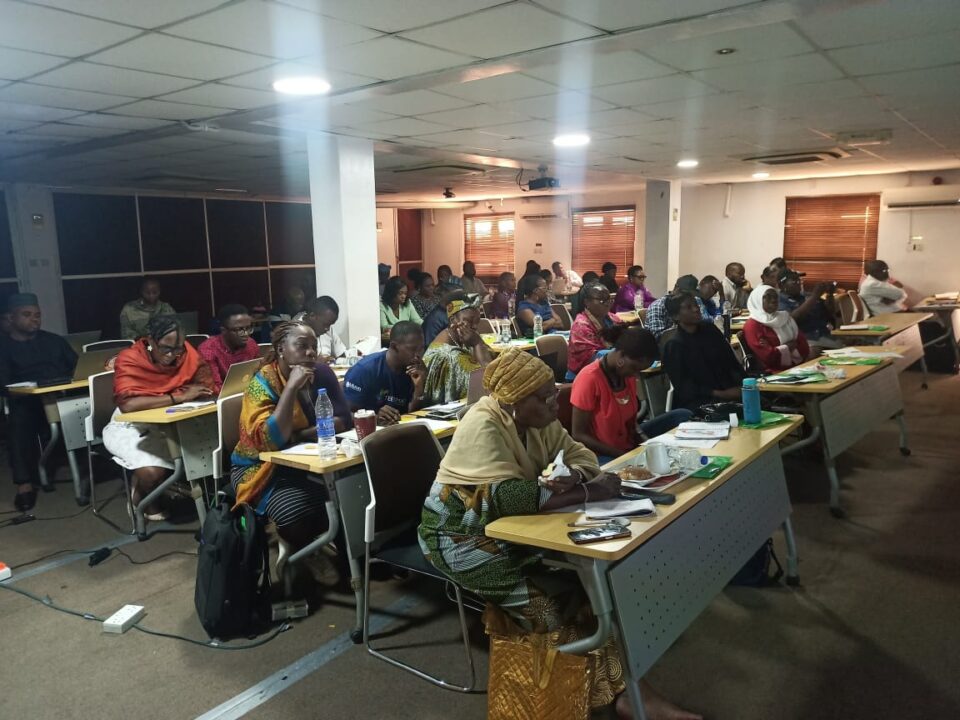By Cyriacus Nnaji
For those who do not know what family planning stands for, it is the consideration of the number of children a person wishes to have, including the choice to have no children, and the age at which they wish to have them. Some of the things that may play a critical role on family planning decisions include marital situation, career or work considerations, financial situations, among others.
In Lagos state, the government, in conjunction with her key partners has ensured in words and action the seriousness it attaches to family planning so that her citizens would boast of quality and healthy reproductive lifestyle. This of course occasioned the formation of a Technical Working Group (TWG) on Family Planning whose role and responsibility include designing a workable blueprint for an implementable family planning service delivery.
Having held its maiden 1st Quarterly meeting in March, 2024, the Group gathered again for the 2nd Quarterly meeting at LCCI, Alausa, Ikeja, Lagos, on May 23, 2024. Made up of professionals and stakeholders in the field of family planning, they charged their energy to discussing key issues, shared insights, and developed strategies to enhance programmes and services of family planning.
The event which was coordinated by the Lagos State Family Planning Manager, Dr Latifat Adeleye, was held at LCCI, Alausa, Ikeja Lagos, on May 23, 2024.
Discussions at the meeting centred on updates on recent family planning initiatives, progress reports and achievements from the first quarter, discussion of challenges and solutions and planning of upcoming projects and events, among others.
On Programme Implementation, Monitoring and Evaluation, the TWG has done a lot, including engagement of 10 data consultants to improve data collection and collation for Family Planning programmes and conducted one round of data validation visit to selected facilities with identified data gaps; quarterly LGA RH/FP Managers Data Analysis and Review Meetings organized by PHCB to deliberate on issues hindering optimal RH/FP services in Primary Health facilities; quarterly monitoring and supervisory visits to PPMVs in Alimosho, Ifako Ijaye and Ojo LGA, which were supported by Integrate in March; Round 11 RAISE Assessment was conducted quarterly, results are a 2.7% increase in the FP domain, a 0.8 decrease in the AYRH domain, and an overall FP/AYRH domain increase of 1.66%, among other achievements.
It group also identified some constraints hindering optimal implementation of Family Planning services in Lagos State which include resource and funding constraints; insufficient FP commodities at site; poor commodity security in the public sector; high cost of commodities preventing providers from maintaining stock; limited access to adolescents due to lack of information and unfriendly attitudes from health workers, restricted access to indigent or vulnerable population, data and reporting challenges, among others.
The group made some Recommendations, they include enhanced collaboration with existing partners and seeking out new stakeholders to leverage their expertise and resources for greater programme impact; enhance training programmes, continuously update healthcare workers’ knowledge and skills in FP service delivery through ongoing training covering new contraceptive methods, counseling techniques; and adopting adolescent friendly services; Expanding awareness campaign by Increasing the scope and frequency of FP awareness campaign using various channels such as the social media, community events and collaborations with community leaders to widely disseminate information.
There was also need to develop community-based programmes to involve local leaders, influencers, organizations directly in FP advocacy and awareness efforts.
A key partner with Lagos State government on Family Planning initiatives, The Challenge Initiative (TCI), a group with presence in 13 countries including Nigeria and supports governments in scaling up high impact family planning interventions and practices in under-resourced, marginalized urban communities, and supports 10 LGAs in Lagos, 68 public and 80 private health facilities, also made presentations.
Dr Omotunde Odonye TCI State Programme Manager in Lagos State in delivering her paper said that TCI under her Lagos intensification Phase (LIP) collaboratively reviewed the state FP indices examining gaps and reached consensus on LIP areas of Focus including commodity security, demand generation, post-partum family planning and private sector engagement.
She added that within the first quarter of 2024, TCI supported a high-level stakeholder meeting chaired by the SA to the Governor on Health to initiate an intensification phase for the FP programme in the state; scale up support from 8LGAs to 10 LGAs, 35 to 68 public facilities, and 30 to 80 private health facilities; supported the inauguration of the SBCC Committee. It also supported a total of 297 social mobilization activities, with a reach of 17, 697 people, 7322 referrals and 5071 (69.3%) completed referrals; facilitated a strategy workshop with LGA FP Managers, HEOs, and M&E officers from the 10 LGAs to improve the agreed 5 areas of focus during the intensification phase.
According to Odonye, TCI supported data management by recruiting 10 data consultants who conduct monthly data validation and coaching to all supported facilities; support LGA M&E to conduct data validation visits to selected facilities with identified data gaps, extracted data of 2,112 postpartum clients across supported facilities directly from the FP register, among other achievements.
She said current challenges in the family planning activities include late release of funds, inadequate consumable, low staff strength at the PHC centres, incomplete facility-level data documentation, and difficulty in assessing complete data from private facilities using EMR.
On next step of activities by TCI, she said that TCI would embark on training of Trainers on PPFP/PPIUD/SD HIPs HIIs; LGA-level on-the-job trainings to providers of all public and supported private facilities; scale up to an additional 50 public health facilities; programme review meeting with key stakeholders; recruitment of SD consultants to support FP managers in the implementation of HIIs, supported refresher training for Health Education Officers; procurement of commodities; among others.
Badijo Olusegun Isaiah, the Lagos State Health Educator while addressing the media spoke on the Bill and Melinda Gate Foundation (BMGF) Project which is the latest project under the supervision of the technical working group designed to carry out research on demand generation and supply of commodities.
Badijo who also doubled as the Director, Health Promotion, Lagos State, added that Bill & Melinda Gate is a development partner and their job is funding family planning programmes, and what they do is to provide both financial and technical services and support to the state governments for family planning provision in the state and that they too can decide to go into research for health survey about family planning utilisation and drug supplies in any state or country.
He said “In the case of Lagos, we have Bill & Milinda Gate; we also have Clinton Health Access Initiative (CHAI). So now there is collaboration between the two of them to carry out research, CHAI wants to carry out research on Demand Generation. Demand generation actually is an activity that would encourage both men and women to adopt any form of family planning products, to access family planning services, so CHAI is looking at the aspect of research on demand generation, how are we able to create demand for family planning uptake. And they also want to see how we do that in Nigeria.
“You see, data is going to be collected and when data are collected, they are meant for informed decisions; the data is for the government to make use of. So in Lagos this is what we have done, these are the strategies that would help us in creating demand for family planning services uptake in Lagos State. So they will review the strategies that have worked and then they will be able to discover more that will enable them to get a better result. The findings of this survey is exactly what the government will make use of because it is for the government to make provision for family planning services for the citizens,” Badijo said.
He also spoke on the activity of the University of Manitoba, Canada in the research effort. “The university of Manitoba working under this, they also want to carry out a research and their own survey is on supply of commodities, they want to look at, do we normally have stockout of commodities within Nigeria, what are the challenges, why are we not getting products all the time, why is it not available all the time whether at primary healthcare centres, secondary healthcare centres or at the tertiary healthcare centres? So they want to review the extent to which the people are utilizing this drugs; they want to look at the regular supplies, how often do we have stockout, what do we need to do in order to ensure we don’t have stockout? So in this regard is there anything stakeholders will do? We want to see more partners coming together, pooling resources together to ensure that the products are always available, then they will also look at, can government actually provide all the funding? Obviously government cannot provide all the funding.”
He averred that there is need for more partners. “So that is why we want more partners to come in so that both partners will have some counterpart funding, government making some provisions, partners making some provisions, then some other civil society organizations also coming together and pooling resources together to ensure at least we are having the regular supply of commodities for family planning so that any time you need it, you can access and you can get it.”
Speaking on the role of the technical working committee in the BMGF Project, he said “Their role as stakeholders is to review the tools and protocols of the research. “That is what I was telling them so that they don’t leave out some stakeholders, because there are key stakeholders that will sit down and review the tools and protocols. So if the key stakeholders are absent, we are not going to get good outcome or we may not be able to get a robust outcome. So we are interested in getting a robust outcome, we are interested in getting good research that is going to help to make informed decisions and move family planning services upward.”
“So that is why the key stakeholders are very key, because they will look at every aspect, there are doctors, nurses, but the health educators are in custody of the social mobilisers, because the social mobilisers are the ones responsible for demand generation in the communities. They are the ones that would gather people and say, come there is family planning services, you need to plan your family, what form of family planning do you like? They are the ones that would gather people and say there is family planning clinic,” Badijo disclosed.



